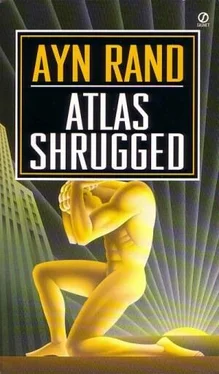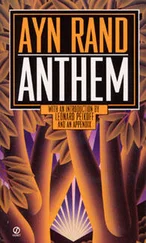Each night, she drove the five miles from the country house to Rockdale. She came back at dawn, slept a few hours and got up with the rest of the household. She felt no desire to sleep. Undressing for bed in the first rays of the sun, she felt a tense, joyous, causeless impatience to face the day that was starting.
She saw Francisco's mocking glance again, across the net of a tennis court. She did not remember the beginning of that game; they had often played tennis together and he had always won. She did not know at what moment she decided that she would win, this time.
When she became aware of it, it was no longer a decision or a wish, but a quiet fury rising within her. She did not know why she had to win; she did not know why it seemed so crucially, urgently necessary; she knew only that she had to and that she would.
It seemed easy to play; it was as if her will had vanished and someone's power were playing for her. She watched Francisco's figure ——a tall, swift figure, the suntan of his arms stressed by his short white shirt sleeves. She felt an arrogant pleasure in seeing the skill of his movements, because this was the thing which she would beat, so that his every expert gesture became her victory, and the brilliant competence of his body became the triumph of hers.
She felt the rising pain of exhaustion—not knowing that it was pain, feeling it only in sudden stabs that made her aware of some part of her body for an instant, to be forgotten in the next: her arm socket—her shoulder blades—her hips, with the white shorts sticking to her skin —the muscles of her legs, when she leaped to meet the ball, but did not remember whether she came down to touch the ground again—her eyelids, when the sky went dark red and the ball came at her through the darkness like a whirling white flame—the thin, hot wire that shot from her ankle, up her back, and went on shooting straight across the air, driving the ball at Francisco's figure. . . . She felt an exultant pleasure—because every stab of pain begun in her body had to end in his, because he was being exhausted as she was—what she did to herself, she was doing it also to him—this was what he felt—this was what she drove him to—it was not her pain that she felt or her body, but his.
In the moments when she saw his face, she saw that he was laughing.
He was looking at her as if he understood. He was playing, not to win, but to make it harder for her—sending his shots wild to make her run —losing points to see her twist her body in an agonizing backhand—standing still, letting her think he would miss, only to let his arm shoot out casually at the last moment and send the ball back with such force that she knew she would miss it. She felt as if she could not move again, not ever—and it was strange to find herself landing suddenly at the other side of the court, smashing the ball in time, smashing it as if she wished it to burst to pieces, as if she wished it were Francisco's face.
Just once more, she thought, even if the next one would crack the bones of her arm . . . Just once more, even if the air which she forced down in gasps past her tight, swollen throat, would be stopped altogether . . . Then she felt nothing, no pain, no muscles, only the thought that she had to beat him, to see him exhausted, to see him collapse, and then she would be free to die in the next moment.
She won. Perhaps it was his laughing that made him lose, for once.
He walked to the net, while she stood still, and threw his racket across, at her feet, as if knowing that this was what she wanted. He walked out of the court and fell down on the grass of the lawn, collapsing, his head on his arm.
She approached him slowly. She stood over him, looking down at his body stretched at her feet, looking at his sweat-drenched shirt and the strands of his hair spilled across his arm. He raised his head. His glance moved slowly up the line of her legs, to her shorts, to her blouse, to her eyes. It was a mocking glance that seemed to see straight through her clothes and through her mind. And it seemed to say that he had won.
She sat at her desk at Rockdale, that night, alone in the old station building, looking at the sky in the window. It was the hour she liked best, when the top panes of the window grew lighter, and the rails of the track outside became threads of blurred silver across the lower panes. She turned off her lamp and watched the vast, soundless motion of light over a motionless earth. Things stood still, not a leaf trembled on the branches, while the sky slowly lost its color and became an expanse that looked like a spread of glowing water.
Her telephone was silent at this hour, almost as if movement had stopped everywhere along the system. She heard steps approaching outside, suddenly, close to the door. Francisco came in. He had never come here before, but she was not astonished to see him.
"What are you doing up at this hour?" she asked.
"I didn't feel like sleeping."
"How did you get here? I didn't hear your car."
"I walked."
Moments passed before she realized that she had not asked him why he came and that she did not want to ask it.
He wandered through the room, looking at the clusters of waybills that hung on the walls, at the calendar with a picture of the Taggart Comet caught in a proud surge of motion toward the onlooker. He seemed casually at home, as if he felt that the place belonged to them, as they always felt wherever they went together. But he did not seem to want to talk. He asked a few questions about her job, then kept silent.
As the light grew outside, movement grew down on the line and the telephone started ringing in the silence. She turned to her work. He sat in a corner, one leg thrown over the arm of his chair, waiting.
She worked swiftly, feeling inordinately clear-headed. She found pleasure in the rapid precision of her hands. She concentrated on the sharp, bright sound of the phone, on the figures of train numbers, car numbers, order numbers. She was conscious of nothing else.
But when a thin sheet of paper fluttered down to the floor and she bent to pick it up, she was suddenly as intently conscious of that particular moment, of herself and her own movement. She noticed her gray linen skirt, the rolled sleeve of her gray blouse and her naked arm reaching down for the paper. She felt her heart stop causelessly in the kind of gasp one feels in moments of anticipation. She picked up the paper and turned back to her desk.
It was almost full daylight. A train went past the station, without stopping. In the purity of the morning light, the long line of car roofs melted into a silver string, and the train seemed suspended above the ground, not quite touching it, going past through the air. The floor of the station trembled., and glass rattled in the windows. She watched the train's flight with a smile of excitement. She glanced at Francisco: he was looking at her, with the same smile.
When the day operator arrived, she turned the station over to him, and they walked out into the morning air. The sun had not yet risen and the air seemed radiant in its stead. She felt no exhaustion. She felt as if she were just getting up.
She started toward her car, but Francisco said, "Let's walk home.
We'll come for the car later."
"All right."
She was not astonished and she did not mind the prospect of walking five miles. It seemed natural; natural to the moment's peculiar reality that was sharply clear, but cut off from everything, immediate, but disconnected, like a bright island in a wall of fog, the heightened, unquestioning reality one feels when one is drunk.
The road led through the woods. They left the highway for an old trail that went twisting among the trees across miles of untouched country. There were no traces of human existence around them. Old ruts, overgrown with grass, made human presence seem more distant, adding the distance of years to the distance of miles. A haze of twilight remained over the ground, but in the breaks between the tree trunks there were leaves that hung in patches of shining green and seemed to light the forest. The leaves hung still. They walked, alone to move through a motionless world. She noticed suddenly that they had not said a word for a long time.
Читать дальше










